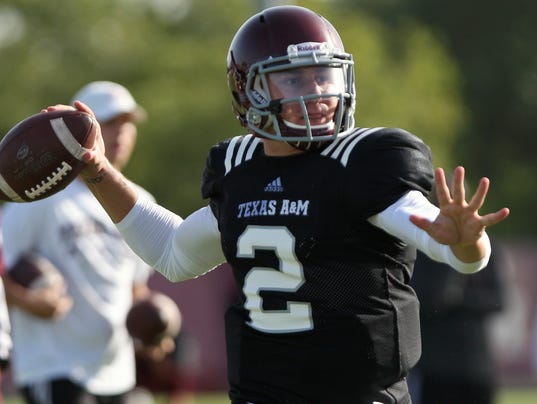 |
| (Photo: Troy Taormina, USA TODAY Sports) |
Of course, the colleges occasionally make some net income off of this free-time activity. It's all in the name of keeping the lights on at our most prestigious institutions. So if a college just so happens to make a whole lot of money in ticket sales, merchandise, TV deals, etc, then it's fine to compensate those who helped bring in that extra money. This is why college football coaches such as Jeff Tedford at Berkeley make an order of magnitude more than a National Academies of Science astronomy professor: Tedford grossed \$2.9M in 2011, compared to \$0.24M for the top-paid UC astronomy prof. This make sense. UC Berkeley football brings in more dough than astronomy. Right?
Right?
But wait, how much did UC Berkeley's star football player bring in? Well, he got free tuition, room and board, and a per diem whenever he traveled. He also got some quality tutoring. The top student in astronomy? Well, he/she got about the same deal (with tutoring optional, of course. But unlike the football player, if the astronomy student breaks her ankle, she gets to keep her scholarship. Not so for the "student-athlete.")
So how dare a star college quarterback go off and make a couple thousand extra bucks on the side selling his autograph?! I'm being facetious, of course. But this is the stance of the NCAA, who would like to revoke Johnny's football-playing privileges for next year. No worries, though, because Johnny can just go to the NFL and bring in millions. Except that he can't, because the NCAA has rules specifying that prospective NFL players must wait three years after high school before turning pro.
Wait, what?!
And if you have any arguments to present based on what paying players would do to the competitive landscape of college sports, please go read this short piece by David Berri at Time:
Competition is unbalanced because the poorest schools are not competing, and if we apply some basic economics, we can see that the NCAA’s prohibition on paying players is part of the problem.It is well past time to figure out how to pay college athletes. My modest proposal: Let athletes sign sponsorship deals on the side, and stop paying college coaches millions. My less modest proposal: scrap the NCAA and start a true minor league for football and basketball with real salaries. This way the pros would get their feeder league, and college football would retain a true sense of amateurism with far less corruption. Maybe.
A competitive market uses prices to allocate resources. But if price increases are not allowed, then non-price issues will dictate the allocation of resources.
Comments